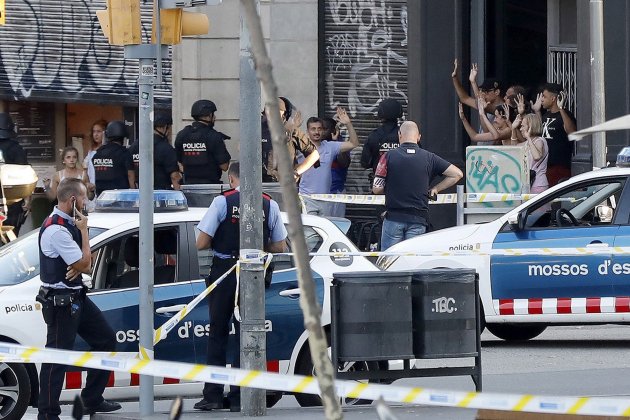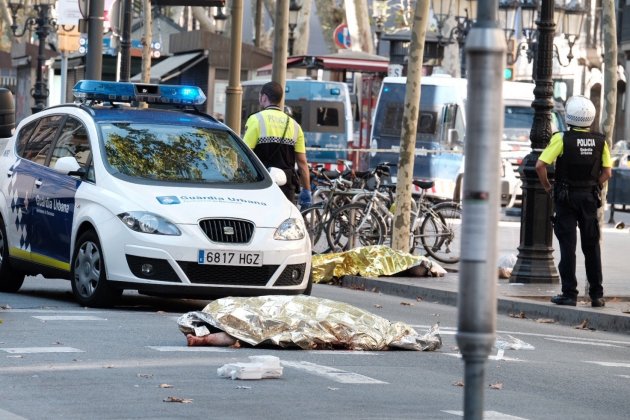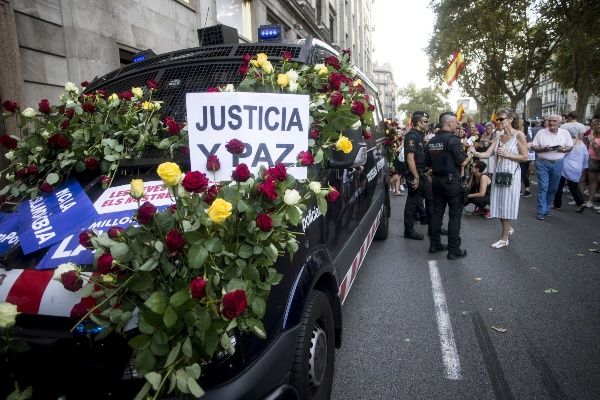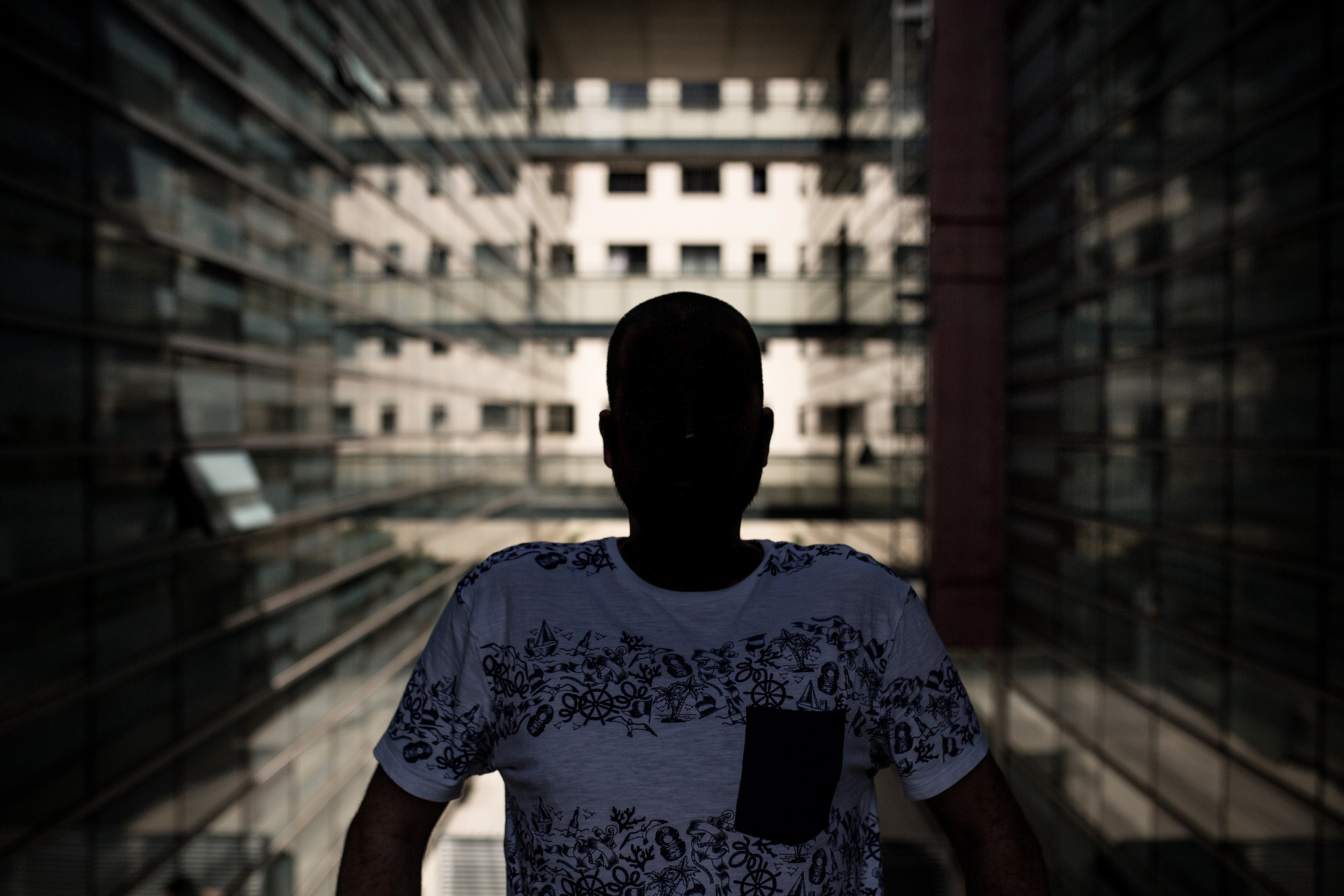"I was working that day and remember that, at 5pm, the control room reported that there was a van running people over on the Rambla. We were on carrer Urgell and headed quickly in that direction. I arrived at the crossroads of the Rambla with carrer Pelai, which is where the van had driven onto the pavement and started to head down. I didn't see it. It had to be quite a way down already. I don't know if it was still going or not".
That's the memory of the first minutes after last year's attack on Barcelona's Rambla of one of the first mossos d'esquadra, members of the Catalan police, to arrive on the scene. He's a public safety officer, assigned to the Eixample neighbourhood, near the city centre. For safety reasons, he's maintaining his anonymity; we'll call him Carles. He's been a mosso since 2009, working beats in the city centre since 2010. He started his shift at 2pm, he was meant to get off at 10: "It was a normal, ordinary shift. It was a normal day, without much work," he says.
Then, suddenly, the day took a turn.
"You know it's going to happen, you don't know when, nor how... Nobody is prepared for that. It's a situation that, however often they tell you you are, you're not ready for it. You've got skills and tools to put into practice, but the situation, however many tools you've got... there's something you're not prepared for. You really don't know anything".
The attack took place around 5pm, but the Mossos didn't confirm publicly that it was terrorism-related until 6:50. But by that time the police had already been working for two hours, following their protocols. "It was an attack. I knew it straight away. It's the first thing you think. The day's arrived".
With the little information there was, the light description he heard over the radio and the first images he could see in person, despite the chaos and the uncertainty of the moment, he knew clearly what was happening: "When we arrived, we found people who'd been run over on the ground, we tried to help someone at first, but it was only briefly, because the ambulance service arrived immediately and we started to control the area. You didn't know who could come out, how, or what they would be carrying", he says with a faraway look, lost in the memory.
The first minutes were full of noise. Chaos and panic mixed with different emergency teams looking to take up positions and bring order. "You act thinking that there are most likely terrorists in the area. And you know what they tell you and what you've seen in other countries, and you have to wait for something to happen. It's a time of great tension, nerves, fear. You do what you can".
At the scene
Carles admits that going to the scene was like entering the lion's den: "On the radio they've told you that there's a large-scale hit-and-run on the Rambla, I find people on the ground, but I don't see the van, I don't see if it's a lorry, I don't see if it's stopped, if it's turned round, if it'll go up or down the street, if there's another. You don't know if it's one terrorist, two, three, four... you don't know if they've got weapons... if they'll fire... you don't know anything. I was there and I felt lost".
Despite the shock, it was likely an attack would come to Barcelona. It was a gut-punch, but didn't take the emergency services by surprise. They'd prepared protocols and action plans, but, on the ground, everyone got through it however they could and put into practice everything they could. "You imagine it can happen, you've already seen it in other countries and where things are heading. You go to a violent robbery and you're confident because you know what you have to do. Here's a situation where you don't know what will happen, what will come next, you don't know anything. And solving that is a very overwhelming".
The enemies: the terrorist and rumours
"I remember that we were there and, suddenly, people start leaving the metro and you get information that there are armed people in the metro, that there were armed people in [department store] Corte Ingés, and you're overwhelmed, honestly, there's little you can do", he says whilst trying to give a full timeline of events. "Then it was all rumours and false alarms that people create".
There was one clear enemy during the attack: the terrorists. The other was the false information which spread on social media, creating panic and making the first, key hours of the investigation more difficult. As such, one of the key messages from the Mossos' Twitter was to not spread rumours or unconfirmed reports. That feed, which became a point of reference for thousands of people to find out what was happening, also gave all the details they could for the public to feel safe and informed.
The rumours stopped dead. But there was a complex situation still to solve, in the restaurant Luna de Istambul.
Luna de Istambul
"A young guy left the restaurant Luna de Istambul running, shouting: 'They're in here. There are armed people in here!'"
And with that, one of the most tense periods on the Rambla started as the city was locked down to avoid anyone escaping.
"The shutter was down. He lifted it up, left and it closed again", says Carles of the start of a stressful forty-five minutes. "I remember that I was at the corner with my colleagues taking cover, all with their regulation weapons in hand, waiting to see what would happen. Until the GEI [Special Intervention Group] and the Brigada Mòbil [Mobile Brigade, riot police] arrived. The riot police formed up with their shields and we focused on the Istambul".
For forty-five minutes the same scene repeated itself: "The shutter would lift up, you wouldn't see anything and it would go down again. And we were like that for three quarters of an hour. They would lift the shutter, they would look around, and lower it again".
The Mossos managed to speak with the owner, who assured them there were no terrorists inside and that everyone was fine. "The guy who ran out frightened, I don't know what he saw or imagined," says Carles.
"I remember that time as being incredibly tense. It lasted a long time. At least three quarters of an hour. It's a long time. You saw your colleagues sheltered behind the cars, behind the trees... behind cover so that if someone with a weapon came out, they'd find us prepared. They were 45 very long minutes. Your heart was going at full whack the whole time because you didn't know what would happen. Finally, luckily, nothing happened".
For safety, the shutter was lifted and everyone inside was made to leave in twos or threes. Carles remembers that they "came out crying. There were kids, families, tourists".
Then the second half of the Luna de Istambul operation could start. They had to check that everything really was in order, that nobody had pressurised the owner, that there were no terrorists hidden among the members of the public. To do so, "all the people who came out of the bar were searched and identified in the McDonalds on carrer Pelai. And when the restaurant was empty, GEI went in with plans provided by the owner. A search was carried out and it was determined there really wasn't anyone".

Photo: Efe
First hours of the investigation
After the first moments of chaos, shouts and sirens, silence took hold of the Rambla. Everyone was confined to the shops.
"At the end of the day I went down to where the van was". They had to secure the whole area. The first hours of an investigation are key, as such "we cordoned off the Rambla so that nobody would enter the area". "I was where the van was for a couple of hours. There was already nothing there. Nobody. Bodies, wrecked kiosks and bar terraces...".

Photo: Sergi Alcàzar
The Mossos flew a drone over the area, the same route the van did from the top of the Rambla, at plaça Catalunya, down to the Miró mosaic outside the Boqueria market.
And whilst they collected evidence from the van, the search for witnesses and images started. "Colleagues of mine were identifying the people in the shops in case they'd seen something or could provide some type of information. Others, we were searching, sealing off the area so that nobody would leave the shops, or would record or walk through the area. From there we had to get evidence and everything was important".
Explosion of gratitude and emotions
"At the end we went to the hotel where the victims' relatives were. There was the team of psychologists and we helped give them food". The day ended at 11:30pm for Carles. "I wanted to get home to see my wife", he said, his voice half-choked with emotion and his eyes watering, "I still get emotional about it. It's normal".
"The following days you had your nerves and emotion running high. The people would come up to you, hug you, thank you, it was emotional all of that. It's hard to process a shift like that. It's the hardest shift I've had in my career, without a doubt", says Carles. "You're emotionally bruised for days, you cry...", he remembers whilst trying to explain the mixture of emotions and responsibility he was faced by that 17th August. "My parents were on holiday, I didn't have them there, my wife was pregnant...".

Photo: Efe
Carles couldn't get in touch with any of them for several hours: "I was working. I couldn't start chatting on my phone. My mobile didn't stop ringing. And as soon as I could, I sent a message saying I was fine and that was that. When I could, I called my mum and dad, my wife".
And the next day, in the same places where, hours earlier, there had been panic, fear and the responsibility to reestablish order, there were instead applause, hugs and flowers. The Mossos became public heroes: "It was just a crazy change... Normally, we always receive criticism for our work and I remember the day after the attack... everyone would stop you, congratulate you, hug you, thank you. In plaça Catalunya there was a minute's silence. I was there and the people were applauding you. That applause, which was long, I had goosebumps. It was crazy the change you noticed in the people".
"Everything turned out well. We were lucky enough that everything turned out well. If you work well... although sometimes actions have turned out badly, this one and the one in Cambrils turned out very well. Luckily".

